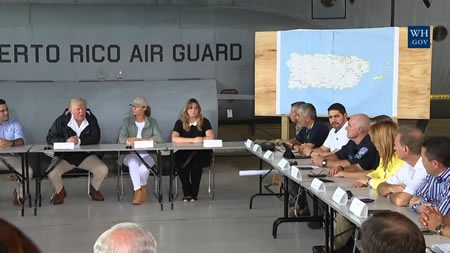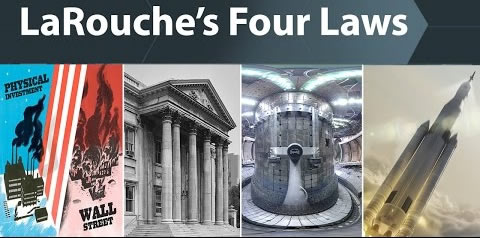Wall Street Quakes as Trump Calls
For Wiping Out Debt of Puerto Rico
by: Harley Schlanger
October 2017
|
President Trump and the First Lady receive a briefing on Hurricane Maria relief efforts |
While the U.S. media continues its nonstop Trump-bashing, now accusing the President of ignoring the suffering of Puerto Ricans hit by Hurricane Maria, the President lobbed a bombshell in an interview that left Wall Street shaken, and the mainstream media temporarily speechless. Following his visit to the island devastated by the storm,Trump told FOX News correspondent Geraldo Rivera that he wants to "wipe out" Puerto Rico's debt, which now stands at approximately $74 billion.
In discussing what the federal government can do to help Puerto Rico, Trump said "we are going to work something out. We have to look at the whole debt structure." Puerto Rico has been struggling to manage its debt since 2014, defaulting on a $58 million bond payment in August 2015, after then-Governor Padilla announced in June 2015 that "the debt is not payable." In June 2016, the Congress refused to address the real debt crisis, instead passing the PROMESA bill, with support from the leadership of both parties, and signed by President Obama. PROMESA established a financial oversight board with full authority over the budget and debt restructuring of the island territory, modeled on the late 1970s BIG MAC financial dictatorship imposed by the banks on New York City, for debt collection.
In signing the bill, Obama said that with PROMESA, "Puerto Rico will now have time to work out an orderly financial path forward." Implicit in this is that the debt, or at least most of it, would have to be paid. To realize this, the oversight board, with Obama's full backing, imposed an even more crippling austerity plan than what had been in place, prioritizing debt payments over health care and pensions. By further weakening the fragile economy, the austerity plan drove the poverty rate up to 45%, and triggered a large-scale emigration from the island.
As Trump has noted, Puerto Rico had been in terrible shape before the two hurricanes hit. In the FOX interview, Trump told Rivera, "They owe a lot of money to your friends on Wall Street. We will have to wipe that out...I don't know if it's Goldman Sachs, but whoever it is, you can wave goodbye to that."
Panic on Wall Street
|
President Trump and the First Lady meet with Governor Kenneth Mapp of the US Virgin Islands. |
Even raising the issue of cancelling Puerto Rico's debt set off panic attacks on Wall Street. The New York Times said that investors "were taken aback" by Trump's comments, as this would mean "major losses for investors". The article identified that among the largest holders of Puerto Rico's bonds are Wall Street giants BlackRock, Inc., Franklin Templeton Investments, and Goldman Sachs' asset management unit. In its coverage, Bloomberg wrote that the idea that over $70 billion in debt could be written off "would shake investors faith." The news triggered a downward plunge of Puerto Rico's bonds, which hit a record low at 37 cents to the dollar.
Almost immediately after Trump's comments, his Office of Management and Budget (OMB) Director Mick Mulvaney was asked to explain what Trump meant. Trying to calm the potential uproar, Mulvaney said he "would not take it [Trump's comment] word for word." He added that the administration "is not going to deal with the fundamental difficulties Puerto Rico had before the storm." This contradicts what Trump has been saying, as he has called for making the commitment to upgrade the island's infrastructure. But then Mulvaney contradicted himself, acknowledging that the federal government is committed to "rebuilding the island."
Adding further to the confusion, Mulvaney, who was formerly a leader of the proausterity "deficit hawk" faction in the Congress, told CBS News that Trump will "absolutely not" bail out Puerto Rico. This could not have been comforting to Wall Street, as he seemed to be admitting that the policy would be to "wipe out" the debt, as the the federal government will not pay off the bond holders. One irate Wall Streeter, Larry McDonald, the head of macro strategies at ACG Analytics, attacked Trump, saying, "This is not a dictatorship. We have bankruptcy judges and the rule of law." He admitted, however, that this discussion "is scaring the bond market."
Hamiltonian Credit To Build Infrastructure
It is not the prospect of writing off $74 billion in Puerto Rico's bonds which is panicking Wall Street. Compared to the tens of trillions of dollars in insolvent debt currently on the books of corporations and financial institutions, and the hundreds of trillions of dollars of derivative obligations they are carrying, it is a drop in the bucket. What frightens them is the possibility that Trump may now be moving to fulfill his campaign promises to put the interests of the people ahead of the banks and multinational corporate cartels. With the end of "easy money" looming for financial institutions, which had allowed them to cover their bad debts and bloated leverage with a zero interest flood of liquidity from the Federal Reserve, there is a high probability that a major credit default will trigger a blowout far bigger than that of 2008. When the 2008 crash happened, George W. Bush and Obama pushed through bailouts and the easy money policy to protect the swindlers of the Too Big to Fail banks and related institutions, allowing them to continue to create speculative bubbles, to greatly exceed the levels of debt they had created in the housing bubble which crashed.
Trump's comments on the Puerto Rico debt came simultaneously with a shift in his approach to infrastructure spending. Previously, his commitment spend $1 trillion for infrastructure had been tied, by the Wall Street neoliberals in his cabinet and Congress, to either spending cuts in other areas, to "free up" funds, or to investment from Public-Private Partnerships, the notorious PPPs, which would limit funding only to programs which could return an immediate profit on every dollar spent. Had this been the requirement at the time of the founding of the United States, it would still be a poor nation dependent primarily on subsistence farming for income.
Instead, under the leadership of the first Treasury Secretary, Alexander Hamilton, the Founding Fathers dealt with their debt problem by generating credit, through a National Bank, which provided funds for major infrastructure projects and manufacturing. Hamilton argued that, by turning the debt into productive credit, the improvement in overall productivity, due to advances in infrastructure, manufacturing, and technology through scientific discovery, would increase the overall real productive wealth of the nation, eliminating the problem of debt as a constraint altogether. Hamilton's policies worked, as the Revolutionary War debt was turned into an asset, as he argued it would be in his "Report on Public Credit" delivered in 1790, and this allowed that debt to be paid off.
|
Establishment of a new Hamiltonian National Bank is the 2nd of LaRouche's Four Laws for economic recovery. The first is re-instatement of the Glass-Steagall Banking Act of 1933. |
This is a central feature of Lyndon LaRouche's Four Basic Laws, to return to the principle of Hamiltonian credit, through a Capital Budget, to fund the development of increasingly energy dense platforms of infrastructure. When Trump campaigned for the return of Glass Steagall banking regulation, and major investment in infrastructure, this provoked real fear on Wall Street, especially since this -- rather than "Russian meddling" -- was a key component in his victory over Wall Street favorite Hillary Clinton. Would Trump dump the old agreements, which put bank and financial profits first, and instead adopt policies based on the principles behind LaRouche's Four Laws?
When Trump met with a group of legislators from the House Ways and Means Committee on September 26, he indicated that public-private partnerships would not work to finance the kind of infrastructure development needed, especially after the destruction from the three hurricanes which hit in August and September. An unnamed White House official told the {Washington Post} that although the administration has researched these approaches (of the PPPs), "they are certainly not the silver bullet for all of our nation's infrastructure problems, and we will continue to consider all viable options." Trump has requested a $29 billion package for disaster aid and rebuilding the stricken areas, to be funded by the federal government.
Wall Street's fear of the possibility of a total break from neoliberal orthodoxy on infrastructure funding and bank regulation is directly linked to the other reason that there is a desperate effort underway to remove Trump from office. The best way for the President to realize a successful infrastructural development package would be for the U.S. to engage in full cooperation with China's Belt and Road Initiative. Trump has already forged a solid relationship with China's President Xi Jinping, and they will soon meet again, when he goes to China in November. The stage is thus set for a full break with the unipolar, neoliberal order which has plunged the TransAtlantic world into a state of permanent war and economic breakdown. The most recent attacks by the media on Secretary of State Rex Tillerson's relationship with the President is evidence of their fear of the emergence of a New Paradigm of international cooperation, which prioritizes development over speculation and debt collection. Tillerson has played a leading role in pushing against the "regime change" doctrine of the two previous administrations, and favors a collaborative relationship with both Russia and China.
Seen in this broader strategic dynamic, it is clear that the Wall Street establishment's hysteria over Trump's comments in Puerto Rico is fully justified.




